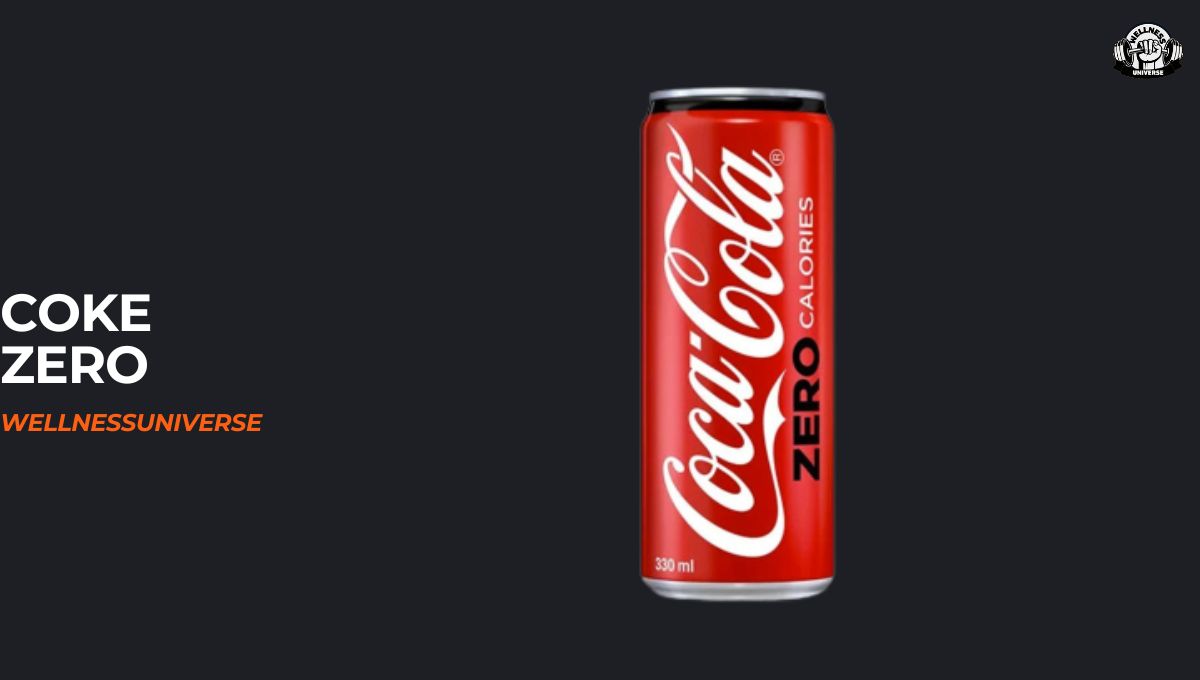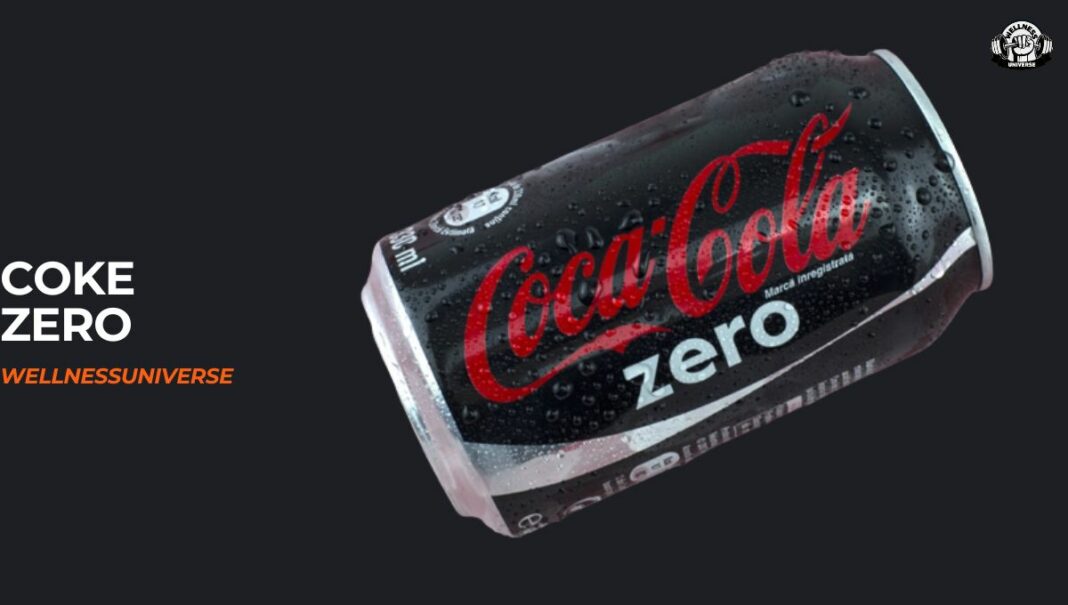Coke Zero is a sugar-free, low-calorie soft drink that belongs to the Coca-Cola family. It was first introduced in 2005 as a response to the increasing demand for healthier beverage options. Unlike regular Coca-Cola, which is sweetened with high-fructose corn syrup or sucrose, Coke Zero is sweetened with a combination of artificial sweeteners, primarily aspartame, and acesulfame potassium. This unique formulation gives it a similar taste to traditional Coca-Cola but without the calories and sugar content.
In this comprehensive blog, we will delve into the world of Coke Zero, exploring its ingredients, taste profile, and how it compares to regular Coca-Cola. We’ll also address its suitability for individuals with specific dietary requirements, such as those on a low-calorie diet or with diabetes. Additionally, we’ll investigate the potential health effects of consuming Coke Zero regularly and its role in weight management. As we journey through the fizzy realm of soft drinks, we’ll also compare Coke Zero with other sugar-free beverage options available on the market. Whether you’re a devoted Coke Zero fan or curious to learn more about this popular sugar-free soft drink, this blog will provide you with all the information you need to make informed choices about your beverage preferences. Let’s quench our thirst for knowledge and dive into the world of Coke Zero!
Coke Zero Ingredients and Sweetener

Coke Zero’s unique taste comes from its carefully selected blend of ingredients, particularly its sweeteners. The primary sweeteners used in Coke Zero are aspartame and acesulfame potassium (Ace-K). Aspartame is an artificial sweetener that is about 200 times sweeter than sucrose (table sugar), making it an effective sugar substitute. It has been widely used in various foods and beverages as a low-calorie alternative to sugar.
Acesulfame potassium, on the other hand, is another calorie-free artificial sweetener that adds sweetness without contributing to caloric intake. It is approximately 200 times sweeter than sucrose and is often used in combination with other sweeteners to enhance the overall taste profile of products like Coke Zero.
Artificial sweeteners have been extensively studied and approved for use by regulatory authorities worldwide, including the U.S. Food and Drug Administration (FDA) and the European Food Safety Authority (EFSA). Aspartame and acesulfame potassium have undergone rigorous safety assessments and have been deemed safe for consumption by the general population, including pregnant women, when consumed within the acceptable daily intake levels established by these regulatory bodies.
It’s important to note that some individuals may have sensitivities or allergies to specific artificial sweeteners, and in such cases, they should avoid consuming products containing these sweeteners. However, for the majority of the population, Coke Zero’s sweeteners present no health concerns when consumed in moderation.
As with any dietary choice, it’s essential to be mindful of individual health needs and preferences. Coke Zero can be a suitable option for those looking to reduce their sugar intake without compromising on taste. The combination of aspartame and acesulfame potassium in Coke Zero provides the sweetness that Coca-Cola enthusiasts love while offering a low-calorie alternative to traditional sugary sodas.
Nutritional Information of Coke Zero
One of the primary reasons why Coke Zero has gained popularity is its low-calorie and sugar-free formulation. As the name suggests, Coke Zero contains zero calories, making it an excellent choice for those looking to manage their caloric intake. Regular Coca-Cola, in contrast, contains a significant amount of sugar and calories, which can contribute to weight gain and other health issues if consumed in excess.
In addition to being calorie-free, Coke Zero is also sugar-free. Unlike traditional Coca-Cola, which contains high levels of sucrose (table sugar), Coke Zero uses aspartame and acesulfame potassium as artificial sweeteners to provide its signature sweet taste without adding any sugar. This makes it a suitable option for individuals who need to monitor their sugar intake, such as those with diabetes or those on low-calorie diets.
For individuals with diabetes or those following a low-calorie diet, Coke Zero can be a beneficial beverage choice. Since it does not contain sugar or carbohydrates, it does not raise blood sugar levels, making it a viable option for people with diabetes to enjoy without concerns about insulin spikes.
Moreover, for those aiming to reduce their overall calorie intake, Coke Zero offers a guilt-free alternative to regular sodas. By choosing Coke Zero over sugary beverages, individuals can enjoy the refreshing taste of Coca-Cola without the added calories and sugar.
However, it’s essential to note that while Coke Zero is a calorie-free and sugar-free option, it should be consumed in moderation, as excessive consumption of artificial sweeteners may have potential health implications for some individuals. As with any dietary choice, it’s best to consult with a healthcare professional or registered dietitian to determine the most suitable beverage options based on individual health needs and goals.
Overall, Coke Zero can be a part of a balanced diet for individuals looking to reduce their sugar and calorie intake while still enjoying a refreshing and familiar beverage option.
Taste Test: Coke Zero vs. Regular Coca-Cola
One of the most crucial aspects of any beverage is its taste, and the comparison between Coke Zero and regular Coca-Cola is no exception. While Coke Zero is marketed as having a taste similar to regular Coca-Cola, some differences can be detected due to the absence of sugar and the use of artificial sweeteners.
Regular Coca-Cola is known for its signature sweet and fizzy taste, which comes from the presence of sucrose (table sugar). The sweetness of sucrose plays a significant role in creating the iconic flavor that many have come to love. On the other hand, Coke Zero utilizes a combination of aspartame and acesulfame potassium, which aim to replicate the sweetness of sugar without adding any calories.
In blind taste tests, many consumers have reported that Coke Zero does closely resemble the taste of regular Coca-Cola. The artificial sweeteners used in Coke Zero are carefully balanced to mimic the sweetness of sugar, resulting in a comparable flavor profile. However, some taste differences may still be apparent to some discerning palates, especially among those who are accustomed to the taste of regular Coca-Cola.
It’s important to note that individual preferences play a significant role in how consumers perceive the taste of Coke Zero compared to regular Coca-Cola. Some individuals may find Coke Zero to be an excellent alternative to regular soda, appreciating its lower calorie and sugar content without compromising much on taste. Others may prefer the classic sweetness of regular Coca-Cola and may find it challenging to fully transition to the taste of Coke Zero.
Ultimately, the choice between Coke Zero and regular Coca-Cola comes down to personal taste preferences and individual health goals. For those seeking to reduce their sugar and calorie intake while enjoying a soda-like experience, Coke Zero can be a satisfying choice. However, for those who prefer the authentic sweetness of regular Coca-Cola, the classic version remains a timeless favorite.
As with any beverage, moderation is key, and individuals should consider their health needs and dietary goals when making their selection. Both Coke Zero and regular Coca-Cola can be enjoyed in moderation as part of a balanced diet.
Caffeine Content in Coke Zero
Caffeine is a natural stimulant found in various beverages, including soft drinks like Coke Zero. It is known for its ability to temporarily boost alertness and reduce feelings of fatigue. Coke Zero, like regular Coca-Cola, contains caffeine, which contributes to its stimulating properties.
The caffeine content in Coke Zero can vary depending on the specific product and serving size. On average, a 12-ounce (355ml) can of Coke Zero contains approximately 34 milligrams of caffeine. In comparison, a 12-ounce can of regular Coca-Cola typically contains around 34 to 45 milligrams of caffeine. It’s important to note that caffeine content may differ among different flavors or variants of Coke Zero.
Caffeine consumption can have both positive and negative effects, and some individuals may have concerns about its impact on their health. While moderate caffeine intake is generally considered safe for most healthy adults, excessive consumption can lead to adverse effects such as restlessness, increased heart rate, and difficulty sleeping.
One advantage of Coke Zero is that it allows individuals to enjoy the taste of a soda without the added sugar and calories found in regular Coca-Cola. However, it’s essential to be mindful of caffeine intake, especially for those who are sensitive to caffeine or have certain health conditions.
Individuals who are particularly sensitive to caffeine or have health issues such as heart problems, high blood pressure, or anxiety, should monitor their caffeine intake carefully. In such cases, it may be advisable to limit the consumption of caffeinated beverages, including Coke Zero, and opt for caffeine-free alternatives.
For most healthy individuals, moderate caffeine intake from beverages like Coke Zero is unlikely to cause any significant issues. However, it’s always best to enjoy caffeinated beverages in moderation and be aware of one’s tolerance to caffeine.
As with any dietary consideration, consulting with a healthcare professional or a registered dietitian can provide personalized guidance based on individual health needs and circumstances. By making informed choices and practicing moderation, individuals can enjoy the flavors of Coke Zero while ensuring their caffeine consumption aligns with their overall health goals.
In Crux
In conclusion, Coke Zero is a sugar-free alternative to regular Coca-Cola, offering consumers a chance to enjoy the classic taste of Coke without the added calories. Throughout this blog, we have explored various aspects of Coke Zero, from its ingredients and sweeteners to its taste and caffeine content.
As with any food or beverage, it’s essential to make informed choices that align with your health and lifestyle goals. For those looking to reduce their sugar intake or manage their calorie consumption, Coke Zero can be a suitable option.
However, it’s crucial to be mindful of the artificial sweeteners used in Coke Zero, especially for individuals with specific health conditions or concerns about their sweetener intake. Moderation is key, and understanding your tolerance to caffeine and sweeteners can help you enjoy Coke Zero responsibly.
For some, Coke Zero may serve as a refreshing beverage choice that complements a balanced diet. For others, there are various alternatives available, including water, herbal teas, or naturally flavored beverages.
Ultimately, the decision of whether to include Coke Zero in your diet should be based on your personal preferences and health considerations. By being informed about the nutritional content and potential effects of Coke Zero, you can make choices that support your overall well-being.
Remember that a balanced diet, regular physical activity, and staying hydrated are essential components of a healthy lifestyle. As you navigate the world of beverages, let your choices reflect your unique health needs and wellness aspirations.
Thank you for joining us on this exploration of Coke Zero. Whether you choose to enjoy it occasionally or opt for other beverage options, may your choices contribute to your overall health and happiness. Cheers to making thoughtful choices that empower you to lead a vibrant and active life!
Thank you for joining us on this fitness journey! We hope you found our Zero Calories, All Flavor: The Coke Zero Experience!? blog insightful and inspiring. Our aim is to provide you with valuable information, expert advice, and motivational content to support you in your wellness endeavors.
Related Post :-
- How To Do Wall Pushups
- Hand Size Demystified
- CrossFit Unleashed
- Barbell Lunges
- Forearm Fortitude
- Kettlebell Circuit
- Power of Personal Trainers
- Down Pull-Ups
FAQs about Coke Zero
What are the artificial sweeteners used in Coke Zero?
The primary sweeteners used in Coke Zero are aspartame and acesulfame potassium (Ace-K). These artificial sweeteners are approved by regulatory authorities, such as the U.S. Food and Drug Administration (FDA), and are considered safe for consumption by the general population.
Does Coke Zero contain any calories or sugar?
Coke Zero is specifically formulated to be calorie-free and sugar-free. It contains no carbohydrates or sugars, making it a popular choice among those following low-carb or calorie-restricted diets.
Is Coke Zero safe for individuals with diabetes or on a low-calorie diet?
Coke Zero can be considered safe for individuals with diabetes as it does not impact blood sugar levels due to its lack of sugar and carbohydrates. However, it is essential to consult with a healthcare professional to ensure it aligns with one's specific dietary needs.
How does Coke Zero's taste compare to regular Coca-Cola?
Coke Zero is designed to replicate the taste of regular Coca-Cola as closely as possible. While some people may find a slight difference in taste due to the absence of sugar, many consumers enjoy a comparable flavor.
Does Coke Zero have any caffeine content?
Yes, Coke Zero contains caffeine, much like regular Coca-Cola. The amount of caffeine varies slightly depending on the region and formula, but it generally contains caffeine for that classic cola kick.
Can pregnant women consume Coke Zero?
Pregnant women should consult their healthcare provider about their dietary choices, including the consumption of Coke Zero. While the artificial sweeteners used are deemed safe for most people, individual health considerations during pregnancy may require personalized advice.
Can Coke Zero contribute to weight gain or weight loss?
Coke Zero is calorie-free, which means it should not contribute to weight gain when consumed in moderation. However, it is essential to remember that maintaining a healthy weight involves various factors, including overall diet and physical activity.
Are there any side effects of drinking Coke Zero in moderation or in excess?
For most people, consuming Coke Zero in moderation is unlikely to cause adverse effects. However, some individuals may be sensitive to artificial sweeteners and could experience digestive discomfort or other minor reactions.
What is the shelf life of unopened Coke Zero bottles or cans?
Coke Zero, like other carbonated beverages, typically has a long shelf life when stored properly. Unopened bottles and cans can stay fresh for several months or even longer. It is advisable to check the expiration date on the packaging for the specific shelf life.

Meet Pradeep Singh, your go-to guide for all things fitness, health, and motivation. With over 7 years in the field, Pradeep brings a blend of expertise and real-world experience to his writing. From workout tips to healthy living insights, he simplifies complex topics, making fitness accessible for everyone. His authentic approach and genuine passion aim to inspire and support your wellness journey. Get ready to embark on a path to a healthier lifestyle with Pradeep as your trusted companion and motivator.






















